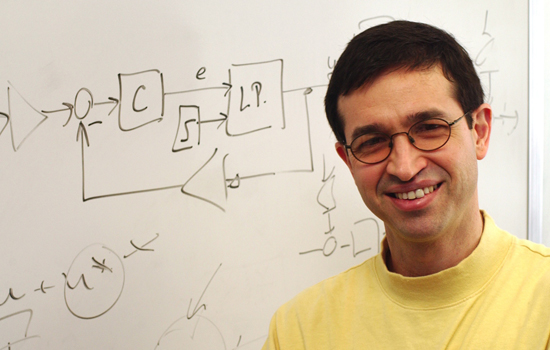Engineering professor awarded professorship
RIT’s Juan Cockburn to participate in year-long mathematics applications immersion program
Juan Cockburn
Rochester Institute of Technology engineering professor Juan Cockburn was recently awarded a New Directions Professorship at the Institute for Mathematics and its Applications, based at the University of Minnesota. He will participate in its one-year, immersive research and development program in control theory and applications as part of his sabbatical year starting fall 2015.
“This is a chance to talk and interact with top researchers who are exploring the boundaries of control theory to learn more about new areas of research they have explored and what promising things are ahead,” said Cockburn, an associate professor of computer engineering in RIT’s Kate Gleason College of Engineering. “It will be a very intense interaction. It is my experience that in these situations, things happen, and so I am putting myself outside of my comfort zone because that’s how you move forward.”
The IMA New Directions Professorship is a one-year intensive program for mid-career university faculty, addressing emerging fields in mathematic applications through workshops, seminars and public lectures by top researchers. IMA, one of eight National Science Foundation Mathematical Sciences Research Institutes, brings together scientists, engineers and mathematicians to collaborate on technological challenges and further train researchers and educators. This year’s principal topic in controls theory aligns with Cockburn’s expertise in this area and the computer engineering department’s emphasis on complex embedded systems’ development and design. Control theory is the study of the behavior of dynamical systems with inputs and how to modify them to achieve desired performance objectives.
“This is a very exciting opportunity for me,” he said. “Today, everything is connected by networks, and we need to understand how to design them so they can achieve the performance that we need. My objective overall is to identify some new research areas that are ready to be exploited and developed further.”
Cockburn received his graduate degree in electrical engineering from the University of Minnesota and was an IMA research associate just after completing his doctoral degree at the university.
“I’m going back to being a student,” he said laughing, adding that the workshops over the next year could be the foundation for new insights in classes he teaches in RIT’s engineering college as well as a multi-disciplinary project he is involved in with other engineering faculty.
“There is a significant gap between what our students learn and what they need to design complex networked systems. Through this program, I’m going to be on the theoretical edge of this area, so I want to try to find a way to bridge this gap and make some of these ideas accessible to the students so that the next generation of computer engineers will use these new tools to cope with today’s very challenging demands,” Cockburn said.
Some of those demands include understanding and developing the emerging Internet of Things—an intertwined network of devices that interact with the environment—as well as large scale energy markets, responsive grids and autonomous vehicles. His intent is to enhance RIT’s capabilities in these areas.
“My sabbatical at the IMA is a very promising initial step,” he added, “and when I come back I would like to bring new ideas to the classroom and contribute to improving our graduate program.”
Prior to joining RIT in 2002, Cockburn was a member of the Department of Electrical Engineering at Florida State University. He also served as a visiting scholar at the Robotics Institute of Carnegie Mellon University and held NRC Summer Faculty Fellowships at the Air Force Research Laboratories at Eglin Air Force Base in Florida. He has authored/co-authored more than 40 technical papers and is a senior member of the Institute of Electrical and Electronic Engineers.










